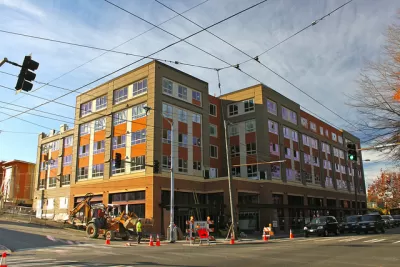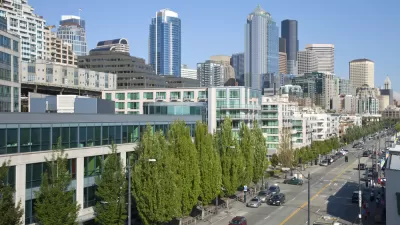Not just any apartments, only those served by frequent transit. Developers will still have a "mobility" requirement: In lieu of a parking space, they'll need to provide tenants with transit passes and memberships in car and bikeshare services.

"City officials say the idea of promoting ways to build apartments without parking is to make room for the denser development needed to accommodate the expected 120,000 new residents of Seattle in the next twenty years," reports Graham Johnson of KIRO 7.
In its presentation [PDF] on "Parking Requirements Near Transit" to the city's Planning, Land Use and Sustainability Committee on May 5, "the Department of Planning and Development [DPD] outlined a recommendation to require developers of new projects in neighborhoods with good transit to provide residents with a pass and membership in a car and bike sharing services," writes Johnson.
Density is but one of the objectives. The strategy can mitigate traffic congestion:
"We don't have enough roadway space for all of the vehicles if everyone was going to be expected to drive a car," said Bryan Stevens of DPD.
Affordability is also a key objective, particularly when tied to building micro-apartments, a housing type where Seattle is king. "At last count, 782 micro-housing units were cleared for occupancy in Seattle, with another 1,598 units in the pipeline," wrote Susan Kelleher for The Seattle Times on March 4. "No other American city comes close."
Housing without parking already exist for "about 2,400 units" according to Johnson, although he doesn't describe the housing types.
In February, Linda Byron of KING 5 News reported that "when it comes to parking, the housing boom is threatening to make free street parking a scarcer commodity in some areas, thanks to city policies that let developers off the hook when it comes to building parking spots in new apartment and condo complexes."
Bryon notes that the "parking-free" ordinance is not new—it goes back five years for housing served by frequent transit located in the two areas described below by DPD:
Urban Centers and Villages
Urban Centers and Villages are areas designated in Seattle's Comprehensive Plan to accommodate future population and job growth. These areas were adopted as part of the 1994 Comprehensive Plan to help guide land use and transportation policies.
Hat tip: Len Conly, Sierra Club Green Transportation.
FULL STORY: New apartments could offer transit passes instead of parking

Planetizen Federal Action Tracker
A weekly monitor of how Trump’s orders and actions are impacting planners and planning in America.

Congressman Proposes Bill to Rename DC Metro “Trump Train”
The Make Autorail Great Again Act would withhold federal funding to the system until the Washington Metropolitan Area Transit Authority (WMATA), rebrands as the Washington Metropolitan Authority for Greater Access (WMAGA).

DARTSpace Platform Streamlines Dallas TOD Application Process
The Dallas transit agency hopes a shorter permitting timeline will boost transit-oriented development around rail stations.

San Francisco's School District Spent $105M To Build Affordable Housing for Teachers — And That's Just the Beginning
SFUSD joins a growing list of school districts using their land holdings to address housing affordability challenges faced by their own employees.

Car-Centric LA Suburb Looks to a Train-Oriented Future
City leaders in Rancho Cucamonga, the future western terminus of the Brightline West rail line to Las Vegas, want to reimagine the city as a transit-oriented, pedestrian-friendly community.

New Alaska Bitcoin Mine Would Burn as Much Energy as the State’s Largest Coal Plant
Fueled by “stranded” natural gas, the startup hopes to become the largest in the US, and to make Alaska an industry center.
Urban Design for Planners 1: Software Tools
This six-course series explores essential urban design concepts using open source software and equips planners with the tools they need to participate fully in the urban design process.
Planning for Universal Design
Learn the tools for implementing Universal Design in planning regulations.
Municipality of Princeton
Roanoke Valley-Alleghany Regional Commission
City of Mt Shasta
City of Camden Redevelopment Agency
City of Astoria
Transportation Research & Education Center (TREC) at Portland State University
US High Speed Rail Association
City of Camden Redevelopment Agency
Municipality of Princeton (NJ)




























